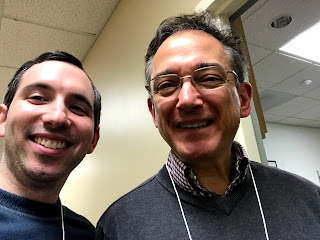
This too is a journey!
As I ponder those questions, I have been working on the challenging text of winding down here. I have been trying to keep up my normal working activities, while also making extra efforts to make phone calls, meet in person, sit down and talk to the people of CAI. For the last seven years, they have been by my side in so many different ways. We have studied Torah together, prayed together, shared celebrations and mourned together. As I go about these coffees, lunches, dinners, meetings I have become overwhelmed by the words of kindness I have heard. I have discovered that small gestures on my part have been received as larger than life by their recipients. A phone call, a text message, a Facebook post, a hospital or home visit.
For me, these are what I imagine is expected behavior from a rabbi. Our job, our career is study, prayer, inspiration, but most of all, it is to be present with the souls of those around us. The job is not just what we put down on paper or in the ether of the internet, but in the human interactions that are far harder to tally. I might have made lists of the thousands of phone calls, hundreds of visits, and far too many funerals, but instead we all have our respective memories.
Through it all, I am most grateful to my beloved. She has stood by me through interrupted dinners, evenings, nights. She has known that those “interruptions” were sacred moments, calls to be with people in their brightest and darkest moments. Being a rabbi is more than a full time position. My phone is always nearby. Even on Shabbat, we can be reached via the doorbell. None of this would be possible without her support and her love. My work is in my office and yours, in my home and yours, within the community in so many different ways. As I say my goodbyes around town, I discover that within the community I am a (very) minor celebrity, that my gestures of goodwill have been well received.
All in all, I am grateful for the time I have spent here. For me, Newburgh and CAI was a place of personal, spiritual, intellectual growth. It was a place where I took the theory of my education and turned it into practical ministry, practical rabbinics. Sometimes I made mistakes, and I hope that I took responsibility for them, that I learned from them. I have never claimed to be perfect, but am always striving to be better, to build a kesher, a connection with Gd and community.
Leaving is bittersweet. New opportunities beckon, new adventures await, yet the love I have for this community will always remain. CAI and Newburgh are holy places. They have been an essential part of my rabbinic journey. I pray for the strong, bright, vibrant future of these holy communities.







